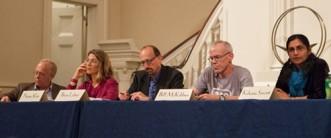Archive
‘Climate Change: Which way out?’ with Naomi Klein, Bill McKibben, Chris Hedges, Bernie Sanders, Kshama Sawant

From left: Chris Hedges, Naomi Klein, Brian Lehrer (moderator), Bill McKibben, Kshama Sawant
I was fortunate to attend the largest climate change march in history on September 21, 2014 in New York City. It was an incredible experience to see roughly 400,000 in the streets demanding urgent action on the climate crisis.
The night before the event, there was a great panel discussion featuring Naomi Klein (author of ‘This Changes Everything: Capitalism vs. the Climate’), Bill McKibben (founder of 350.org), Chris Hedges (author and former New York Times correspondent), U.S. Senator Bernie Sanders, and Kshama Sawant (newly elected socialist councilor in Seattle who helped implement a $15/hr minimum wage in the city). It was an incredible night and the atmosphere at the All Souls Unitarian Universalist Church in Manhattan was electric, as you will hear.
Below are the speeches of the five panelists speaking on September 20, 2014 in New York:
Bernie Sanders – U.S. Senator from Vermont
[audio https://earthgauge.files.wordpress.com/2014/11/berniesanders-sept20-2014.mp3]—
Bill McKibben – author, activist and co-founder of 350.org
[audio https://earthgauge.files.wordpress.com/2014/11/billmckibben-nyc-sept20-2014.mp3]—
Naomi Klein – journalist and author of ‘This Changes Everything: Capitalism vs. The Climate’
[audio https://earthgauge.files.wordpress.com/2014/11/naomiklein-nyc-sept20-2014.mp3]—
Chris Hedges – author and former war correspondent for the New York Times
[audio https://earthgauge.files.wordpress.com/2014/11/chrishedges-nyc-sept20-2014.mp3]—
Kshama Sawant – Seattle city counselor
[audio https://earthgauge.files.wordpress.com/2014/11/kshamasawant-nyc-sept20-2014.mp3]
We’re all climate change idiots!
In a timely follow up to my post below, Beth Gardiner wrote an article in today’s New York Times in which she considers why in the face of so much scientific evidence, we are doing so little to address the crisis of climate change. Entitled ‘We’re all climate change idiots”, Gardiner takes a look at the emerging field of climate psychology. If you want to gain some insight into our heroically underwhelming lack of action, this article is well worth a read. Here are some excerpts:
The mental habits that help us navigate the local, practical demands of day-to-day life make it difficult to engage with the more abstract, global dangers posed by climate change…We have trouble imagining a future drastically different from the present. We block out complex problems that lack simple solutions. We dislike delayed benefits and so are reluctant to sacrifice today for future gains. And we find it harder to confront problems that creep up on us than emergencies that hit quickly. We also tend to pay attention to information that reinforces what we already believe and dismiss evidence that would require us to change our minds, a phenomenon known as confirmation bias.
“You almost couldn’t design a problem that is a worse fit with our underlying psychology,” says Anthony Leiserowitz, director of the Yale Project on Climate Change Communication.